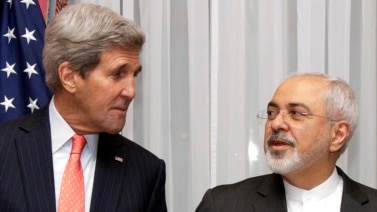Israelis elected a new parliament this week. The results gave 30 seats in the 120-member parliament to the Likud Party of Prime Minister Benjamin Netanyahu. The Zionist Union finished second, winning 24 seats. A union of four Arab-led parties won 14 seats to become the third largest group in Israel’s parliament, the Knesset.
Mr. Netanyahu has said he plans to form a government in the next two or three weeks. He said he already spoke with smaller parties on forming the 61-seat coalition he needs to govern. On Thursday, Zionist Union leader Isaac Herzog said his party will not join the coalition.
In the United States, debate has begun over how the election results will affect U.S. relations with Israel. Differences on major issues have led to increased tensions between the countries.
Earlier this month, Prime Minister Netanyahu traveled to Washington and spoke to a joint meeting of the U.S. Congress. His comments about nuclear negotiations with Iran angered the administration of President Barack Obama. He called a yet-to-be-announced agreement with Iran, “a bad deal.”
There are also tensions about the Middle East peace process. Earlier this week, Mr. Netanyahu said he would never support a Palestinian state. His comment came in the final hours of the election campaign. It appeared to overturn the position he had held as prime minister, when Israelis and Palestinians held peace talks. Those negotiations eventually broke down.
On Thursday, Mr. Netanyahu appeared to step away from that comment. He told American media he does not object to a “demilitarized Palestinian state.” But he said that creation of such a state is not possible at the current time.
In the United States, lawmakers of the two major parties have congratulated Israel on the elections. But there was a striking difference in public statements between Republicans and Democrats.
The Speaker of the House of Representatives, John Boehner, was satisfied with the election results. “Heartfelt congratulations to Netanyahu,” he wrote on Twitter. Speaker Boehner said he was “looking forward to continuing the strong bond” between the two countries.
Another Republican, Utah Senator Orrin Hatch, made clear he was cheering for Mr. Netanyahu, or, as he calls him, “Bibi.”
“Bibi is one of the strongest people I’ve seen in the, in the world. So you gotta give him a lot of credit for winning that election and, personally, I believe that’s in the best interests of Israel, and I’m glad they (Israeli voters) made that choice.”
But many Democrats seemed to avoid discussion of Mr. Netanyahu at all. Pennsylvania Senator Bob Casey described the ties between the United States and Israel as “unbreakable.”
“We’re gonna be not only supportive of Israel’s security, but also reaffirming the values that bring our countries together. So that’s, in short, I think, (the case) no matter, no matter what happens in any election.”
Another Democrat, Senator Richard Blumenthal of Connecticut, had a similarly measured reaction.
“I’m looking forward to continuing to work with Prime Minister Netanyahu and seeking peace in the Middle East.”
Neri Zilber is with The Washington Institute for Near East Policy. He says the United States may continue having problems with Mr. Netanyahu’s way of doing things. But he expects a continued U.S. push for its policy objectives in Israel. In his words, “you can expect an increased push by this administration on the Palestinian peace process. The U.S. will likely put forward its own idea with respect to what a negotiated final status agreement looks like,” whether Mr. Netanyahu and the Israeli government like it or not.
I’m Christopher Jones-Cruise.
This report was based on stories from VOA’s News Division. George Grow wrote it for VOA Learning English. Mario Ritter was the editor.
Words in the News
parliament – n. a government lawmaking group
party – n. a group of people working together for a political purpose
government – n. a system of governing; the organization of people that rules a country, a city or area
debate – n. a public discussion or argument

